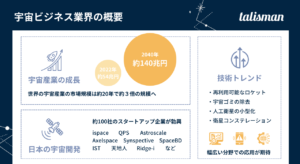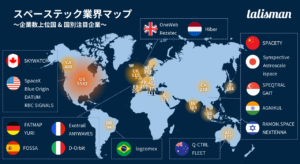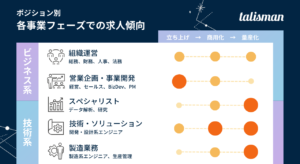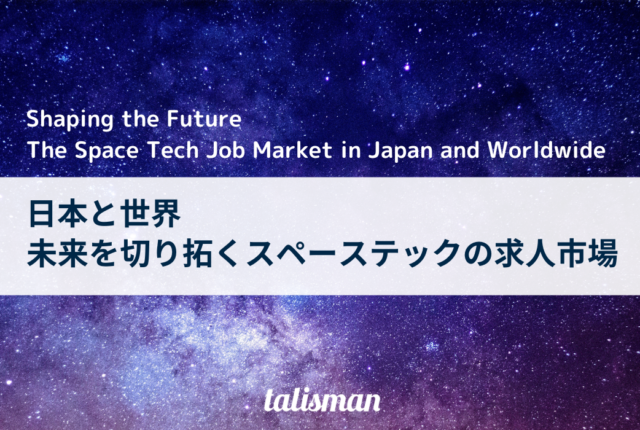In recent years, businesses in the space industry have been expanding their market size due to the entry of private companies and technological innovations. Space development is full of potential as a new industry beyond the government-led framework of the past, such as rocket recycling technology, miniaturization of satellites, and even space travel. However, it is also true that there are many aspects of the space business industry that are difficult to understand.
In this article, we will explain the current state and future prospects of the space industry, also known as Space Tech, based on the latest information available in 2024. It details the major companies in the industry, the hottest space ventures, the latest technology trends, as well as the latest job trends and future forecasts that our space industry specialist recruitment consultants are in contact with on a daily basis, providing a practical guide for engineers, researchers, and businesspeople who are looking for a career in the space industry.
- Hello, my name is Ami! Talisman Corporation’s Space Tech Specialist Consultant.
We hope you find this industry map useful as a first step in realizing your career change to the space industry. Ami
Ami
目次
Space Business Industry Overview

Growth of the Space Industry
The space tech industry has been growing rapidly in recent years, with the global space industry market size reaching approximately 54 trillion yen in 2022. In addition, according to Morgan Stanley’s forecast,the market size will reach 140 trillion yen by 2040. Considering that the market size of the entire automobile industry, which has developed over more than 100 years since the Industrial Revolution, is estimated to be about 400 trillion yen, the market size and growth speed of the space industry may be objectively understood.The evolution of technology and the active participation of private companies have contributed greatly to this growth, and the transition from the traditional public-sector initiative to private-sector initiative is underway.(Current market breakdown: about one-quarter of the total market is government budget, and about three-quarters is private companies’ commercial satellite services and space transportation-related)
※Calculated at 140 yen to the dollar.
The flow of Japanese space development
Space development in Japan has for many years been driven mainly by the Japan Aerospace Exploration Agency (JAXA) and the following major heavy industry and electronics companies.
- Mitsubishi Heavy Industries, Ltd.
Leader in Japanese space transportation technology, responsible for the development and launch of the H-IIA and H3 rockets. - SKY Perfect JSAT Corporation
As Japan’s largest satellite operator, it has played an important role in the operation of communications and broadcasting satellites - NEC Corporation
Supported satellite development and the HAYABUSA project, contributing to space exploration and satellite technology - TOSHIBA CORPORATION
Supported space communications and exploration technology through the development of satellite communications equipment and space exploration electronics
Recent years have seen the emergence of venture companies.In particular, about 100 start-up ventures derived from universities and other institutions are actively starting operations in the space sector. Representative start-ups are listed below.
- ispace
Lunar exploration and payload services (transport to the moon’s surface and lunar orbit). - QPS, Inc.
Development of a small SAR satellite capable of observing the earth’s surface regardless of weather conditions and day/night time. - Astroscale Japan Inc.
Involved in space debris removal and other on-orbit services. - Axelspace Corporation
Development of microsatellites and earth observation service projects, etc. - Synspective
Development of small SAR satellites to sales of SAR data and provision of solutions.
The Japanese space industry currently has a market size of approximately 4 trillion yen, but the Government aims to double this in the early 2030s (to approximately 8 trillion yen) and has established a 10-year, 1 trillion yen ‘Space Strategy Fund’ at JAXA. The fund will initially provide up to 300 billion yen in 22 themes in the three fields of space transportation, satellites and exploration. It is expected that medium- to long-term financial support for private companies and universities will stimulate the space business in Japan to a greater extent than ever before.
Trends in space exploration technology
As for technological trends, advances in technologies such as reusable rocket technology, space debris removal, miniaturisation of satellites and satellite constellations (networks of several small satellites) are notable.And around them, exploration technology, including robot teleoperation technology, and surface observation technology have developed respectively.
In Japan, in line with the Space Technology Strategy newly formulated by the Japanese Government for 2024, the development of various technologies related to lunar exploration and development, such as lunar landing, communications and lunar resource development and utilisation, is also of high importance.
These new technologies have significantly reduced the cost of access to space and facilitated the expansion of space business. Commercial Earth observation satellite data and space infrastructure are also being developed, with potential applications in a wide range of fields, including disaster prevention and mitigation, environmental monitoring and agricultural support.
(Source: March 2024, Ministry of Economy, Trade and Industry.‘The Ministry of Economy, Trade and Industry’s (METI’s) initiatives in light of trends in the space industry at home and abroad, and the future.’
Industry map of the space industry
The space tech industry map summarises the companies of note by segment and the top countries in terms of the number of companies in the space tech domain.
Looking at the segments, it can be seen that Japanese companies (shown in light blue bold) are the focus of attention for their activities in the areas of ‘Platform’ and ‘Other (services, etc.)’.

In terms of the number of companies by country, the USA is in first place with almost 5,600 companies, far ahead of the second place and accounting for half of the world’s total number of companies. Japan ranks ninth in the world with approximately 180 companies, and third in Asia after India and China.

(注目企業は「SpaceTechMap2024」を基に、国別企業数は「SpaceTech Industry 2021 Landscape Overview」を基に35ish編集部が作成しました)
- Some of the jobs that Talisman can introduce you to are shown at the bottom of the article↓.
Some are not open to the public, so please feel free to contact us for more information! Ami
Ami
The following is a list of companies listed in the SpaceTechMap 2024, published by Seraphim Space, the world’s largest investment company specialising in the space sector. You can also search by category, which is useful for gathering information.
The category ‘UPSTREAM’ in the table indicates business areas in infrastructure, such as the manufacture and launch of rockets and satellites. DOWNSTREAM’ refers to business areas that utilise data acquired mainly from space.
| 大分類 | 中分類 | 小分類 | 企業名 / Website | 国 |
|---|---|---|---|---|
| UPSTREAM | BUILD | SPACE HARD WARESATELLITES | ENDUROSAT | |
| UPSTREAM | BUILD | SPACE HARD WARESATELLITES | aerospacelab | |
| UPSTREAM | BUILD | SPACE HARD WARESATELLITES | SPACETY | |
| UPSTREAM | BUILD | SPACE HARD WARESATELLITES | albaorbital | |
| UPSTREAM | BUILD | SPACE HARD WARESATELLITES | OPEN COSMOS | |
| UPSTREAM | BUILD | SPACE HARD WARESATELLITES | LOFT ORBITAL | |
| UPSTREAM | BUILD | SPACE HARD WARESATELLITES | nano avionics | |
| UPSTREAM | BUILD | SPACE HARD WARESATELLITES | YORK SPACE SYSTEMS | |
| UPSTREAM | BUILD | SPACE HARD WARESATELLITES | BLUE CANYON TECHNOLOGIES | |
| UPSTREAM | BUILD | SPACE HARD WARESATELLITES | APEX | |
| UPSTREAM | BUILD | SPACE HARD WARESATELLITES | ASTRO DIGITAL | |
| UPSTREAM | BUILD | SPACE HARD WARESATELLITES | REFLEX AEROSPACE | |
| UPSTREAM | BUILD | SPACE HARD WARESATELLITES | LEO STELLA | |
| UPSTREAM | BUILD | SPACE HARD WARESATELLITES | MDA | |
| UPSTREAM | BUILD | SPACE HARD WARESATELLITES | AAC CLYDE SPACE | |
| UPSTREAM | BUILD | SPACE HARD WARESATELLITES | MuonSpace | |
| UPSTREAM | BUILD | SPACE HARD WARESATELLITES | NEWORBIT | |
| UPSTREAM | BUILD | SPACE HARD WARESATELLITES | K2 SPACE | |
| UPSTREAM | BUILD | SPACE HARD WARESATELLITES | SATLANTIS | |
| UPSTREAM | BUILD | SPACE HARD WARESATELLITES | TERRAN ORBITAL | |
| UPSTREAM | BUILD | SPACE HARD WARESATELLITES | GOMSPACE | |
| UPSTREAM | BUILD | SPACE HARD WARESATELLITES | reorbit | |
| UPSTREAM | BUILD | SPACE HARD WAREPROPULSION | MORPHEUS SPACE | |
| UPSTREAM | BUILD | SPACE HARD WAREPROPULSION | Benchmark Space Systems | |
| UPSTREAM | BUILD | SPACE HARD WAREPROPULSION | Agile Space Industries | |
| UPSTREAM | BUILD | SPACE HARD WAREPROPULSION | DAWN AEROSPACE | |
| UPSTREAM | BUILD | SPACE HARD WAREPROPULSION | PHASEFOUR | |
| UPSTREAM | BUILD | SPACE HARD WAREPROPULSION | Accion Systems (Revolution Space) | |
| UPSTREAM | BUILD | SPACE HARD WAREPROPULSION | FRONTIER AEROSPACE | |
| UPSTREAM | BUILD | SPACE HARD WAREPROPULSION | Exotrail | |
| UPSTREAM | BUILD | SPACE HARD WAREPROPULSION | ORBION | |
| UPSTREAM | BUILD | SPACE HARD WAREPROPULSION | Ursa Major | |
| UPSTREAM | BUILD | SPACE HARD WARESUBCOMPONENTS | SOLESTIAL | |
| UPSTREAM | BUILD | SPACE HARD WARESUBCOMPONENTS | CESIUM | |
| UPSTREAM | BUILD | SPACE HARD WARESUBCOMPONENTS | HADRIAN | |
| UPSTREAM | BUILD | SPACE HARD WARESUBCOMPONENTS | PSIONIC | |
| UPSTREAM | BUILD | SPACE HARD WARESUBCOMPONENTS | CHAOS | |
| UPSTREAM | BUILD | SPACE HARD WARESUBCOMPONENTS | CAMBIUM | |
| UPSTREAM | BUILD | SPACE HARD WARESUBCOMPONENTS | Swissto12 | |
| UPSTREAM | BUILD | SPACE HARD WARESUBCOMPONENTS | AKASH SYSTEMS | |
| UPSTREAM | BUILD | SPACE HARD WARESUBCOMPONENTS | UBOTICA | |
| UPSTREAM | BUILD | SPACE HARD WARESUBCOMPONENTS | Carbice | |
| UPSTREAM | BUILD | SPACE HARD WARESUBCOMPONENTS | Q-CTRL | |
| UPSTREAM | BUILD | SPACE HARD WARESUBCOMPONENTS | Formlogic | |
| UPSTREAM | BUILD | SPACE HARD WARESUBCOMPONENTS | Freeform | |
| UPSTREAM | BUILD | SPACE HARD WARESUBCOMPONENTS | MACHINA LABS | |
| UPSTREAM | BUILD | SPACE HARD WARESUBCOMPONENTS | OXFORD SPACE SYSTEMS | |
| UPSTREAM | BUILD | SPACE HARD WARESUBCOMPONENTS | ANYWAVES | |
| UPSTREAM | BUILD | SPACE HARD WARESUBCOMPONENTS | RAMON.SPACE | |
| UPSTREAM | BUILD | SOFTWAREIN-SPACE | Kayhan.space | |
| UPSTREAM | BUILD | SOFTWAREIN-SPACE | quindar | |
| UPSTREAM | BUILD | SOFTWAREIN-SPACE | SEDARO | |
| UPSTREAM | BUILD | SOFTWAREIN-SPACE | lean space | |
| UPSTREAM | BUILD | SOFTWAREIN-SPACE | AALYRIA | |
| UPSTREAM | BUILD | SOFTWAREIN-SPACE | COGNITIVE SPACE | |
| UPSTREAM | BUILD | SOFTWAREIN-SPACE | ANTARIS | |
| UPSTREAM | BUILD | SOFTWAREIN-SPACE | KYTHERA SPACE SOLUTIONS | |
| UPSTREAM | BUILD | SOFTWARETERRESTRIAL | FIRST RESONANCE | |
| UPSTREAM | BUILD | SOFTWARETERRESTRIAL | SIFT | |
| UPSTREAM | BUILD | SOFTWARETERRESTRIAL | VIOLETLABS | |
| UPSTREAM | BUILD | SOFTWARETERRESTRIAL | VALISPACE | |
| UPSTREAM | BUILD | SOFTWARETERRESTRIAL | Integrate | |
| UPSTREAM | BUILD | SOFTWARETERRESTRIAL | STELL | |
| UPSTREAM | BUILD | SOFTWARETERRESTRIAL | DATUM Logic based sourcing | |
| UPSTREAM | BUILD | SOFTWARETERRESTRIAL | Epsilon3 | |
| UPSTREAM | LAUNCH | LAUNCHERS | SPACE X | |
| UPSTREAM | LAUNCH | LAUNCHERS | ROCKETLAB | |
| UPSTREAM | LAUNCH | LAUNCHERS | X-BOW | |
| UPSTREAM | LAUNCH | LAUNCHERS | SPIN LAUNCH | |
| UPSTREAM | LAUNCH | LAUNCHERS | Isar Aerospace | |
| UPSTREAM | LAUNCH | LAUNCHERS | SKYRORA | |
| UPSTREAM | LAUNCH | LAUNCHERS | Relativity | |
| UPSTREAM | LAUNCH | LAUNCHERS | FIREFLY | |
| UPSTREAM | LAUNCH | LAUNCHERS | Reaction Engines | |
| UPSTREAM | LAUNCH | LAUNCHERS | RFA | |
| UPSTREAM | LAUNCH | LAUNCHERS | BLUE ORIGIN | |
| UPSTREAM | LAUNCH | LAUNCHERS | INTERSTELLAR TECHNOLOGIES | |
| UPSTREAM | LAUNCH | LAUNCHERS | AGNIKUL | |
| UPSTREAM | LAUNCH | LAUNCHERS | PHANTOM SPACE CORPORATION | |
| UPSTREAM | LAUNCH | LAUNCHERS | ASTRA | |
| UPSTREAM | LAUNCH | LAUNCHERS | PLD SPACE | |
| UPSTREAM | LAUNCH | LAUNCHERS | AURIGA | |
| UPSTREAM | LAUNCH | LAUNCHERS | SKYROOT | |
| UPSTREAM | LAUNCH | LAUNCHERS | ORBEX | |
| UPSTREAM | LAUNCH | LAUNCHERS | abl | |
| UPSTREAM | LAUNCH | SPACE TUGS | EXO LAUNCH | |
| UPSTREAM | LAUNCH | SPACE TUGS | D-Orbit | |
| UPSTREAM | LAUNCH | SPACE TUGS | TRANSASTRA | |
| UPSTREAM | LAUNCH | SPACE TUGS | SPACE MACHINES COMPANY | |
| UPSTREAM | LAUNCH | SPACE TUGS | ATOMOS | |
| UPSTREAM | LAUNCH | SPACE TUGS | SPACE FLIGHT | |
| UPSTREAM | LAUNCH | SPACE TUGS | MOMENTUS SPACE | |
| UPSTREAM | LAUNCH | SPACE TUGS | IMPULSE SPACE | |
| UPSTREAM | LAUNCH | SPACE TUGS | LAUNCHER | |
| UPSTREAM | LAUNCH | SPACE TUGS | EPIC AEROSPACE | |
| UPSTREAM | PLATFORMS | SATELLITE CONSTELLATIONSREMOTE SENSING | HawkEye360 | |
| UPSTREAM | PLATFORMS | SATELLITE CONSTELLATIONSREMOTE SENSING | ARRAY LABS | |
| UPSTREAM | PLATFORMS | SATELLITE CONSTELLATIONSREMOTE SENSING | AXELSPACE | |
| UPSTREAM | PLATFORMS | SATELLITE CONSTELLATIONSREMOTE SENSING | Wyvern | |
| UPSTREAM | PLATFORMS | SATELLITE CONSTELLATIONSREMOTE SENSING | Hydrosat | |
| UPSTREAM | PLATFORMS | SATELLITE CONSTELLATIONSREMOTE SENSING | constellr | |
| UPSTREAM | PLATFORMS | SATELLITE CONSTELLATIONSREMOTE SENSING | pixxel | |
| UPSTREAM | PLATFORMS | SATELLITE CONSTELLATIONSREMOTE SENSING | NUVIEW | |
| UPSTREAM | PLATFORMS | SATELLITE CONSTELLATIONSREMOTE SENSING | spire | |
| UPSTREAM | PLATFORMS | SATELLITE CONSTELLATIONSREMOTE SENSING | HySpeclQ | |
| UPSTREAM | PLATFORMS | SATELLITE CONSTELLATIONSREMOTE SENSING | OSK | |
| UPSTREAM | PLATFORMS | SATELLITE CONSTELLATIONSREMOTE SENSING | ALBEDO | |
| UPSTREAM | PLATFORMS | SATELLITE CONSTELLATIONSREMOTE SENSING | SATREV | |
| UPSTREAM | PLATFORMS | SATELLITE CONSTELLATIONSREMOTE SENSING | ICEYE | |
| UPSTREAM | PLATFORMS | SATELLITE CONSTELLATIONSREMOTE SENSING | planet | |
| UPSTREAM | PLATFORMS | SATELLITE CONSTELLATIONSREMOTE SENSING | SATELLITEVU | |
| UPSTREAM | PLATFORMS | SATELLITE CONSTELLATIONSREMOTE SENSING | PLANETiQ | |
| UPSTREAM | PLATFORMS | SATELLITE CONSTELLATIONSREMOTE SENSING | Capella Space | |
| UPSTREAM | PLATFORMS | SATELLITE CONSTELLATIONSREMOTE SENSING | unseenlabs | |
| UPSTREAM | PLATFORMS | SATELLITE CONSTELLATIONSREMOTE SENSING | Synspective | |
| UPSTREAM | PLATFORMS | SATELLITE CONSTELLATIONSREMOTE SENSING | GHGSAT | |
| UPSTREAM | PLATFORMS | SATELLITE CONSTELLATIONSREMOTE SENSING | BLACK SKY | |
| UPSTREAM | PLATFORMS | SATELLITE CONSTELLATIONSREMOTE SENSING | tomorrow.io | |
| UPSTREAM | PLATFORMS | SATELLITE CONSTELLATIONSREMOTE SENSING | HYPERSAT | |
| UPSTREAM | PLATFORMS | SATELLITE CONSTELLATIONSREMOTE SENSING | UMBRA | |
| UPSTREAM | PLATFORMS | SATELLITE CONSTELLATIONSREMOTE SENSING | SATELLOGIC | |
| UPSTREAM | PLATFORMS | SATELLITE CONSTELLATIONSREMOTE SENSING | KUVA SPACE | |
| UPSTREAM | PLATFORMS | CONNECTIVITY | LYNK | |
| UPSTREAM | PLATFORMS | CONNECTIVITY | STARLINK | |
| UPSTREAM | PLATFORMS | CONNECTIVITY | Xona Space Systems | |
| UPSTREAM | PLATFORMS | CONNECTIVITY | OneWeb | |
| UPSTREAM | PLATFORMS | CONNECTIVITY | AST | |
| UPSTREAM | PLATFORMS | CONNECTIVITY | HEDRON | |
| UPSTREAM | PLATFORMS | CONNECTIVITY | RIVADA | |
| UPSTREAM | PLATFORMS | CONNECTIVITY | SPEQTRAL | |
| UPSTREAM | PLATFORMS | CONNECTIVITY | WARPSPACE | |
| UPSTREAM | PLATFORMS | CONNECTIVITY | TRUSTPOINT | |
| UPSTREAM | PLATFORMS | CONNECTIVITY | E-SPACE | |
| UPSTREAM | PLATFORMS | CONNECTIVITY | ASTRANIS | |
| UPSTREAM | PLATFORMS | CONNECTIVITY | omnispace | |
| UPSTREAM | PLATFORMS | CONNECTIVITY | Kacific | |
| UPSTREAM | PLATFORMS | CONNECTIVITY | SKYKRAFT | |
| UPSTREAM | PLATFORMS | CONNECTIVITY | MANGATA | |
| UPSTREAM | PLATFORMS | IOT | FLEET | |
| UPSTREAM | PLATFORMS | IOT | kineis | |
| UPSTREAM | PLATFORMS | IOT | astrocast | |
| UPSTREAM | PLATFORMS | IOT | FOSSA | |
| UPSTREAM | PLATFORMS | IOT | SATELIOT | |
| UPSTREAM | PLATFORMS | IOT | Myriota | |
| UPSTREAM | PLATFORMS | IOT | hubble | |
| UPSTREAM | PLATFORMS | IOT | Swarm Technologies | |
| UPSTREAM | PLATFORMS | IOT | OQ TECHNOLOGY | |
| UPSTREAM | PLATFORMS | IOT | eSAT GLOBAL | |
| UPSTREAM | PLATFORMS | HAPS | urban sky | |
| UPSTREAM | PLATFORMS | HAPS | SKYDWELLER | |
| UPSTREAM | PLATFORMS | HAPS | SCEYE | |
| UPSTREAM | PLATFORMS | HAPS | HAPS MOBILE | |
| UPSTREAM | PLATFORMS | HAPS | NEAR SPACE LABS | |
| UPSTREAM | PLATFORMS | HAPS | KRAUS HAMDANI | |
| UPSTREAM | PLATFORMS | HAPS | WORLD VIEW | |
| DOWNSTREAM | DOWNLINK | COMMUNICATIONS | QuadSAT | |
| DOWNSTREAM | DOWNLINK | COMMUNICATIONS | CLUTCH SPACE SYSTEMS | |
| DOWNSTREAM | DOWNLINK | COMMUNICATIONS | K4mobility | |
| DOWNSTREAM | DOWNLINK | COMMUNICATIONS | Slyloom | |
| DOWNSTREAM | DOWNLINK | COMMUNICATIONS | Infostellar | |
| DOWNSTREAM | DOWNLINK | COMMUNICATIONS | Ansur | |
| DOWNSTREAM | DOWNLINK | COMMUNICATIONS | mynaric | |
| DOWNSTREAM | DOWNLINK | COMMUNICATIONS | Astrapi | |
| DOWNSTREAM | DOWNLINK | COMMUNICATIONS | RBC SIGNALS | |
| DOWNSTREAM | DOWNLINK | COMMUNICATIONS | TRANSCELESTIAL | |
| DOWNSTREAM | DOWNLINK | COMMUNICATIONS | CONNEKTICA | |
| DOWNSTREAM | DOWNLINK | COMMUNICATIONS | ATLAS SPACE OPERATIONS | |
| DOWNSTREAM | DOWNLINK | COMMUNICATIONS | LEAF SPACE | |
| DOWNSTREAM | DOWNLINK | COMMUNICATIONS | skylo | |
| DOWNSTREAM | DOWNLINK | COMMUNICATIONS | BRIDGE COMM | |
| DOWNSTREAM | DOWNLINK | COMMUNICATIONS | espace | |
| DOWNSTREAM | DOWNLINK | COMMUNICATIONS | cailabs | |
| DOWNSTREAM | DOWNLINK | COMMUNICATIONS | ACCELERCOMM | |
| DOWNSTREAM | DOWNLINK | GROUND TERMINALS | ALL. SPACE | |
| DOWNSTREAM | DOWNLINK | GROUND TERMINALS | Greener wave | |
| DOWNSTREAM | DOWNLINK | GROUND TERMINALS | requtech | |
| DOWNSTREAM | DOWNLINK | GROUND TERMINALS | alcan | |
| DOWNSTREAM | DOWNLINK | GROUND TERMINALS | KYMETA | |
| DOWNSTREAM | DOWNLINK | GROUND TERMINALS | UTVATE | |
| DOWNSTREAM | DOWNLINK | GROUND TERMINALS | sofant tachnologies | |
| DOWNSTREAM | DOWNLINK | GROUND TERMINALS | KRUCIAL | |
| DOWNSTREAM | DOWNLINK | GROUND TERMINALS | hiber | |
| DOWNSTREAM | DOWNLINK | GROUND TERMINALS | QUASAR SAT | |
| DOWNSTREAM | DOWNLINK | GROUND TERMINALS | NEXTENNA | |
| DOWNSTREAM | DOWNLINK | GROUND TERMINALS | oneNav | |
| DOWNSTREAM | DOWNLINK | GROUND TERMINALS | hiSky | |
| DOWNSTREAM | DOWNLINK | GROUND TERMINALS | SatixFy | |
| DOWNSTREAM | DOWNLINK | SECURITY&STORAGE | ThinkQuantum | |
| DOWNSTREAM | DOWNLINK | SECURITY&STORAGE | KETS | |
| DOWNSTREAM | DOWNLINK | SECURITY&STORAGE | ARMADA | |
| DOWNSTREAM | DOWNLINK | SECURITY&STORAGE | http://infiniquant.com/" target="_blank" rel="noopener">InfiniQuant | |
| DOWNSTREAM | DOWNLINK | SECURITY&STORAGE | SpiderOak | |
| DOWNSTREAM | DOWNLINK | SECURITY&STORAGE | - | |
| DOWNSTREAM | DOWNLINK | SECURITY&STORAGE | CONNECTX | |
| DOWNSTREAM | DOWNLINK | SECURITY&STORAGE | Cryota Labs | |
| DOWNSTREAM | DOWNLINK | SECURITY&STORAGE | REBEL SPACE | |
| DOWNSTREAM | ANALYSE | SATELLITE DATA | Planet Watchers | |
| DOWNSTREAM | ANALYSE | SATELLITE DATA | Descartes Labs | |
| DOWNSTREAM | ANALYSE | SATELLITE DATA | SPACE KNOW | |
| DOWNSTREAM | ANALYSE | SATELLITE DATA | PRELIGENS | |
| DOWNSTREAM | ANALYSE | SATELLITE DATA | Rezatec | |
| DOWNSTREAM | ANALYSE | SATELLITE DATA | ARTURO | |
| DOWNSTREAM | ANALYSE | SATELLITE DATA | ASTERRA | |
| DOWNSTREAM | ANALYSE | SATELLITE DATA | SATSURE | |
| DOWNSTREAM | ANALYSE | SATELLITE DATA | astraea | |
| DOWNSTREAM | ANALYSE | SATELLITE DATA | Risilience | |
| DOWNSTREAM | ANALYSE | SATELLITE DATA | AIDASH | |
| DOWNSTREAM | ANALYSE | SATELLITE DATA | LiveEO | |
| DOWNSTREAM | ANALYSE | SATELLITE DATA | Orbital Insight | |
| DOWNSTREAM | ANALYSE | SATELLITE DATA | SYNMAX | |
| DOWNSTREAM | ANALYSE | SATELLITE DATA | Cloudeo | |
| DOWNSTREAM | ANALYSE | SATELLITE DATA | ICterra | |
| DOWNSTREAM | ANALYSE | SATELLITE DATA | OVERSTORY | |
| DOWNSTREAM | ANALYSE | SATELLITE DATA | regrow | |
| DOWNSTREAM | ANALYSE | SATELLITE DATA | vibrant planet | |
| DOWNSTREAM | ANALYSE | SATELLITE DATA | EOS data analytics | |
| DOWNSTREAM | ANALYSE | SATELLITE DATA | entelligent | |
| DOWNSTREAM | ANALYSE | SATELLITE DATA | Jua | |
| DOWNSTREAM | ANALYSE | SATELLITE DATA | SKYWATCH | |
| DOWNSTREAM | ANALYSE | SATELLITE DATA | gsi | |
| DOWNSTREAM | ANALYSE | SATELLITE DATA | GAIT | |
| DOWNSTREAM | ANALYSE | SATELLITE DATA | URSA SPACE | |
| DOWNSTREAM | ANALYSE | SATELLITE DATA | CAPE ANALYTICS | |
| DOWNSTREAM | ANALYSE | SATELLITE DATA | Atlas AI | |
| DOWNSTREAM | ANALYSE | SATELLITE DATA | TRANIS | |
| DOWNSTREAM | ANALYSE | SATELLITE DATA | GEOSPATIAL INSIGHT | |
| DOWNSTREAM | ANALYSE | SATELLITE DATA | CLIMATE AI | |
| DOWNSTREAM | PRODUCT | CLIMATE | PERSEFONI | |
| DOWNSTREAM | PRODUCT | CLIMATE | SATAVIA | |
| DOWNSTREAM | PRODUCT | CLIMATE | Sylvera | |
| DOWNSTREAM | PRODUCT | CLIMATE | Concirrus | |
| DOWNSTREAM | PRODUCT | CLIMATE | Climavision | |
| DOWNSTREAM | PRODUCT | CLIMATE | NCX | |
| DOWNSTREAM | PRODUCT | CLIMATE | Agreena | |
| DOWNSTREAM | PRODUCT | CLIMATE | Pachama | |
| DOWNSTREAM | PRODUCT | CLIMATE | EARTHOPTICS | |
| DOWNSTREAM | PRODUCT | CLIMATE | RENOSTER | |
| DOWNSTREAM | PRODUCT | CLIMATE | BeZero | |
| DOWNSTREAM | PRODUCT | CLIMATE | EARTH AI | |
| DOWNSTREAM | PRODUCT | CLIMATE | one concern | |
| DOWNSTREAM | PRODUCT | CLIMATE | KAYRROS | |
| DOWNSTREAM | PRODUCT | CLIMATE | JUPITER | |
| DOWNSTREAM | PRODUCT | LOGISTICS | logcomex | |
| DOWNSTREAM | PRODUCT | LOGISTICS | WINDWARD | |
| DOWNSTREAM | PRODUCT | LOGISTICS | Beacon | |
| DOWNSTREAM | PRODUCT | LOGISTICS | zeitview | |
| DOWNSTREAM | PRODUCT | LOGISTICS | SHIPPEO | |
| DOWNSTREAM | PRODUCT | LOGISTICS | VIZION | |
| DOWNSTREAM | PRODUCT | LOGISTICS | project44 | |
| DOWNSTREAM | PRODUCT | INSURANCE | Raincoat | |
| DOWNSTREAM | PRODUCT | INSURANCE | Descartes Underwriting | |
| DOWNSTREAM | PRODUCT | INSURANCE | kettle | |
| DOWNSTREAM | PRODUCT | INSURANCE | FloodFlash | |
| DOWNSTREAM | PRODUCT | INSURANCE | FLOODBASE | |
| DOWNSTREAM | PRODUCT | INSURANCE | PULA | |
| DOWNSTREAM | PRODUCT | INSURANCE | http://zesty.ai/" target="_blank" rel="noopener">zesty.ai | |
| DOWNSTREAM | PRODUCT | INSURANCE | reThought | |
| DOWNSTREAM | PRODUCT | INSURANCE | Delos | |
| DOWNSTREAM | PRODUCT | LOCATION&MAPPING | TERALYTICS | |
| DOWNSTREAM | PRODUCT | LOCATION&MAPPING | Mapware | |
| DOWNSTREAM | PRODUCT | LOCATION&MAPPING | FocalPoint | |
| DOWNSTREAM | PRODUCT | LOCATION&MAPPING | unacast | |
| DOWNSTREAM | PRODUCT | LOCATION&MAPPING | what3words | |
| DOWNSTREAM | PRODUCT | LOCATION&MAPPING | FATMAP | |
| DOWNSTREAM | PRODUCT | LOCATION&MAPPING | EDGYBEES | |
| DOWNSTREAM | PRODUCT | LOCATION&MAPPING | swift NAVIGATION | |
| DOWNSTREAM | PRODUCT | LOCATION&MAPPING | next billion.ai | |
| DOWNSTREAM | PRODUCT | LOCATION&MAPPING | mapbox | |
| DOWNSTREAM | PRODUCT | LOCATION&MAPPING | carto | |
| DOWNSTREAM | PRODUCT | OTHER | blackshark | |
| DOWNSTREAM | PRODUCT | OTHER | Agritask | |
| DOWNSTREAM | PRODUCT | OTHER | ceres | |
| DOWNSTREAM | PRODUCT | OTHER | BIFROST | |
| DOWNSTREAM | PRODUCT | OTHER | RAIC Labs (formerly Synthetaic) | |
| DOWNSTREAM | PRODUCT | OTHER | VORTEXA | |
| DOWNSTREAM | PRODUCT | OTHER | MODERN INTELLIGENCE | |
| DOWNSTREAM | PRODUCT | OTHER | DANTI | |
| DOWNSTREAM | PRODUCT | OTHER | unabiz | |
| IN-SPACE ECONOMY | SPACE SERVICES | clearspace today | ||
| IN-SPACE ECONOMY | SPACE SERVICES | Astrocscale | ||
| IN-SPACE ECONOMY | SPACE SERVICES | NORTHSTAR | ||
| IN-SPACE ECONOMY | SPACE SERVICES | KEPLER | ||
| IN-SPACE ECONOMY | SPACE SERVICES | LEOLABS | ||
| IN-SPACE ECONOMY | SPACE SERVICES | SLINGSHOT AEROSPACE | ||
| IN-SPACE ECONOMY | SPACE SERVICES | OKAPI | ||
| IN-SPACE ECONOMY | SPACE SERVICES | STARFISH SPACE | ||
| IN-SPACE ECONOMY | SPACE SERVICES | PRIVATEER | ||
| IN-SPACE ECONOMY | SPACE SERVICES | ORBITFAB | ||
| IN-SPACE ECONOMY | SPACE SERVICES | True Anomaly | ||
| IN-SPACE ECONOMY | SPACE SERVICES | TURIONSPACE | ||
| IN-SPACE ECONOMY | SPACE SERVICES | Kurs Orbital | ||
| IN-SPACE ECONOMY | SPACE SERVICES | DIGANTARA | ||
| IN-SPACE ECONOMY | SPACE SERVICES | VYOMA | ||
| IN-SPACE ECONOMY | SPACE SERVICES | HEO Robotics | ||
| IN-SPACE ECONOMY | SPACE SERVICES | RHEA SPACE ACTIVITY | ||
| IN-SPACE ECONOMY | SPACE INFRASTRUCTURE | AXIOM SPACE | ||
| IN-SPACE ECONOMY | SPACE INFRASTRUCTURE | GITAI | ||
| IN-SPACE ECONOMY | SPACE INFRASTRUCTURE | VOYAGER SPACE | ||
| IN-SPACE ECONOMY | SPACE INFRASTRUCTURE | QUANTUM SPACE | ||
| IN-SPACE ECONOMY | SPACE INFRASTRUCTURE | GRAVITICS | ||
| IN-SPACE ECONOMY | SPACE INFRASTRUCTURE | AVALANCHE | ||
| IN-SPACE ECONOMY | SPACE INFRASTRUCTURE | The Exploration Company | ||
| IN-SPACE ECONOMY | SPACE INFRASTRUCTURE | Inversion | ||
| IN-SPACE ECONOMY | SPACE INFRASTRUCTURE | Vast | ||
| IN-SPACE ECONOMY | SPACE INFRASTRUCTURE | REDWIRE | ||
| IN-SPACE ECONOMY | SPACE INFRASTRUCTURE | OUTPOST | ||
| IN-SPACE ECONOMY | SPACE INFRASTRUCTURE | SIERRA | ||
| IN-SPACE ECONOMY | SPACE INFRASTRUCTURE | ATMOS | ||
| IN-SPACE ECONOMY | SPACE INFRASTRUCTURE | OVERVIEW ENERGY | ||
| IN-SPACE ECONOMY | SPACE INFRASTRUCTURE | RADIAN AEROSPACE | ||
| IN-SPACE ECONOMY | IN-SPACE R&D / MANUFACTURING | YURI | ||
| IN-SPACE ECONOMY | IN-SPACE R&D / MANUFACTURING | SPACE FORGE | ||
| IN-SPACE ECONOMY | IN-SPACE R&D / MANUFACTURING | SPACE TANGO | ||
| IN-SPACE ECONOMY | IN-SPACE R&D / MANUFACTURING | VARDA | ||
| IN-SPACE ECONOMY | IN-SPACE R&D / MANUFACTURING | CEMVITA | ||
| IN-SPACE ECONOMY | IN-SPACE R&D / MANUFACTURING | SOLAR FOODS | ||
| IN-SPACE ECONOMY | IN-SPACE R&D / MANUFACTURING | CISLUNAR INDUSTRIES | ||
| IN-SPACE ECONOMY | IN-SPACE R&D / MANUFACTURING | Nanoracks | ||
| IN-SPACE ECONOMY | IN-SPACE R&D / MANUFACTURING | ELEVATION SPACE | ||
| IN-SPACE ECONOMY | IN-SPACE R&D / MANUFACTURING | SPACE PHARMA | ||
| IN-SPACE ECONOMY | EXPORATION & UTILIZATION | OFF WORLD | ||
| IN-SPACE ECONOMY | EXPORATION & UTILIZATION | QOSMOSYS | ||
| IN-SPACE ECONOMY | EXPORATION & UTILIZATION | ASTROLAB VENTURI | ||
| IN-SPACE ECONOMY | EXPORATION & UTILIZATION | Orbite | ||
| IN-SPACE ECONOMY | EXPORATION & UTILIZATION | ispace | ||
| IN-SPACE ECONOMY | EXPORATION & UTILIZATION | PTS | ||
| IN-SPACE ECONOMY | EXPORATION & UTILIZATION | MAANA ELECTRIC | ||
| IN-SPACE ECONOMY | EXPORATION & UTILIZATION | ASTROBOTIC | ||
| IN-SPACE ECONOMY | EXPORATION & UTILIZATION | Virgin Galactic | ||
| IN-SPACE ECONOMY | EXPORATION & UTILIZATION | INTUITIVE MACHINES | ||
| IN-SPACE ECONOMY | EXPORATION & UTILIZATION | SPACE PERSPECTIVE | ||
| IN-SPACE ECONOMY | EXPORATION & UTILIZATION | ASTRO FORGE |
Current status and prospects of the job market in the space industry
As many space tech companies accelerate their space-related projects, the demand for engineers and other professionals is increasing rapidly. This section provides an overview of the current and future job situation in the space tech industry.
Current job market
① Overall job trends
- Increased demand for jobs
The number of jobs in the space technology industry is increasing year by year, with demand rising, particularly for positions related to satellite launches and space exploration. By region, there is a wide variety of jobs in the USA and Europe, where the market is large.
② Job types with the majority of vacancies
- Engineering positions (rocket, satellite)
There are many opportunities in engineering jobs related to satellite development and rocket launches. Due to the increasing complexity of each project, engineers with a wealth of practical experience are required, and it is generally a difficult field for those with no industry experience to take on the challenge. Embedded software engineers are also required to have a major or experience in a similar field, such as automotive or robotics. - Data scientist and analytical engineer
These positions analyse the vast amounts of data acquired from satellites and space exploration missions, and are in increasing demand by governments and commercial companies in many countries, particularly for their ability to utilise AI and big data.
③ Regional job trends
- USA
The USA is a leader in space tech, with some 5,600 space companies (as of 2021), mainly large companies such as SpaceX, Blue Origin, Boeing and Northrop Grumman, generating a relatively large number of job opportunities. Engineering jobs are also increasing, particularly in California, where SpaceX is also headquartered, and in Texas, which is home to many technology companies and has historically been a leader in space exploration from the Johnson Space Center. - EU
Europe is also seeing an increase in job opportunities, particularly in ESA (European Space Agency) and Airbus Defence and Space. The UK (world’s second-largest space company), Germany (fourth-largest) and France (seventh-largest) are of particular interest, as are their participation in space exploration and communications satellite projects.
④ Changing job needs of space tech companies in Japan.

- Changing talent needs in each phase of the business
During the business start-up phase in space ventures, there is a high need for business positions and other positions that oversee the entire project. As the commercialisation and mass production phases progress, there is a tendency for highly specialised positions such as technical/solutions and manufacturing positions to be sought after.
The ideal candidate needs to be breakthrough and highly motivated in order to create and expand innovative businesses, and all positions tend to require people who can work on a global scale.
(Source: 令和4年度宇宙産業技術情報基盤整備研究開発事業(SERVIS プロジェクト)のうち宇宙産業人的基盤強化に資する 調査事業 事業報告書 令和5年3月 デロイト トーマツ コンサルティング合同会社)
Future prospects for the job market in the space industry
① New projects and their impact on the job market
- Increase in low earth orbit (LEO) satellite projects
Business using low earth orbit (LEO) satellite constellations is accelerating worldwide, including SpaceX’s Starlink in the USA, and the demand for engineers is expected to increase further as a result. In particular, the number of engineering jobs in satellite design and system operations is expected to increase. - Expansion of space exploration missions
Private companies as well as state-affiliated organisations are actively participating in space exploration missions, such as NASA’s privately procured payload transportation services (CLPS) to the Moon. Demand is expected to continue in projects related to Mars and lunar exploration, making this a field where long-term career development is possible.
② Occupations expected to increase in the future
- Attitude and Orbit Control System (AOCS) engineers
The increase in the number of satellites creates a greater demand for attitude and orbit control system (AOCS) engineers, who are particularly needed for satellite communications and observation missions, as they provide the technical support to ensure that satellites maintain their orbits accurately and are able to carry out their missions. - Flight Dynamics Engineer
The role of flight dynamics engineers, who perform orbit calculations and predictions during satellite operations and launches, is also becoming increasingly important. The need for such specialists will increase, especially in complex missions involving multiple satellites. - Data scientist
As the amount of data acquired from satellites grows, the demand for data scientists to analyse data and develop AI-based systems will continue to increase. Data analysis for new satellite missions, earth observation and weather data will become more advanced.
③ Examples of growth segments
- Commercial space travel
In September 2024, the first ever ‘extra-vehicular activity’ in space by a private citizen was widely covered in the news by a SpaceX spacecraft. Commercial space travel led by SpaceX and Blue Origin is expected to continue to develop, and new occupations are likely to emerge, such as astronaut training, mission support and life support in the space environment. - Sustainability and space debris disposal
With the increase in satellite destruction experiments and small satellite constellations, space debris is also increasing at an accelerated rate, and the deterioration of the space usage environment is becoming an issue. As rules are developed around the world regarding the control of space debris generation in orbit and the reduction of space debris, demand for companies with debris disposal technology and satellite life extension technology is expected to increase and new jobs related to these technologies are also expected to increas.Japanese start-up Astroscale is one of the companies ahead of the US and Europe in debris removal technology demonstrations and is attracting a lot of attention. Ami
Ami
Tips on finding a job in the space industry
1. How to find jobs
① Use of major job websites
- LinkedIn↗︎
‘LinkedIn’ is a powerful tool that allows you to connect directly with space exploration companies and recruiters through a global network. By keeping your profile up-to-date and highlighting your relevant skills and experience, you can expect to be scouted by agents and recruiters. - space-job.jp↗︎
The space industry-focused job site ‘space-job.jp’ is a valuable source of information on job vacancies at space-related companies in Japan and abroad. It is a particularly strong ally for jobseekers targeting the Japanese market. - SPACE CREW↗︎・Space-Careers↗︎
SPACE CREW and Space Careers (Europe-centric) are the best places to look for international space-related careers. They cover a wide range of positions in engineering, research and development and project management. - Japan Dev↗︎
Japan Dev is a job site dedicated to engineers working in Japan, but you can also find jobs related to space exploration. The site is particularly useful for jobseekers looking to work for foreign companies or start-ups.
② Use of agents and scouting services
- Advantages of using a recruitment agent
Recruitment agents with expertise in the space exploration industry are more likely to be able to introduce you to private jobs, and there are many scouting opportunities available through these agents. They can also help you brush up your resume and prepare for interviews, so you can proceed with confidence even if this is your first job change.Unfortunately, there are still not many agents in Japan with dedicated space industry teams or consultants, but we Talisman are one of the few. AmiIn addition, although the space industry is becoming increasingly privatised, many projects are related to national politics, and from a security perspective, the country of origin of applicants may be restricted. However, some companies disclose this and some do not, so there are significant advantages to using an agent to avoid wasting effort.
AmiIn addition, although the space industry is becoming increasingly privatised, many projects are related to national politics, and from a security perspective, the country of origin of applicants may be restricted. However, some companies disclose this and some do not, so there are significant advantages to using an agent to avoid wasting effort. Ami
Ami
- Use of the scout function
It is important to enable the scout function on LinkedIn and other job sites and make your profile attractive. In particular, detail your technical skills and experience in space exploration projects to catch the attention of company recruiters.
2. Interview preparation specific to the space industry.
① Examples of frequently asked questions
- Technical questions
The space industry requires an in-depth understanding of the technical aspects of the industry, so many of the interview questions relate to technical specialisms. Technical interview questions are often related to your personal experience (CV) and you should be able to talk about them in depth by reviewing your own background rather than preparing for a pattern. From the stage of preparing your application, you should be looking ahead to the interview, reviewing your basic knowledge of your field of expertise and preparing to showcase your practical experience. - Questions on project experience
There are always questions about past projects. You should be able to give specific details about the scale of the projects you were involved in, the technical challenges and your role in the team. Highlight how you solved problems and contributed to the success of the project to demonstrate your practical skills. - Questions about company and national culture
The fit with the culture of the company and the country is also a key factor to be checked. This is to minimise any gaps in the working environment and working style that you may experience after joining the company. For example, if you are moving from the US to Japan, you may be asked about the unique Japanese business style and salary gap.
② Key points in the interview.
- Emphasise problem-solving skills
In the field of space exploration, the ability to deal with unknown challenges is of great importance. Therefore, the key to success in an interview is to demonstrate your ‘problem-solving’ and ‘innovation’ skills. It is a good idea to prepare specific episodes of how you solved technical problems and troubles you actually experienced. - Teamwork and communication skills
Cooperation with multinational and multidisciplinary teams is essential in the space industry. In interviews, demonstrate your leadership and communication skills by talking about your role in teams on previous projects and specific examples of collaboration with other departments.
Support for career change from Talisman Corporation
For a successful career change in the space industry, professional support is recommended. Talisman can offer comprehensive support tailored to the needs of jobseekers. Below are some of our key support offerings
1. CV review and brushing up of applications
- Checking the aspirations and requirements of job seekers
First, we interview candidates in detail about their specific career goals, work location and position preferences. By confirming the desired technical field and career path, we identify the most suitable company and position for the candidate, rather than simply a vague motive such as ‘I want to be involved in space development’ or ‘I want to work in Japan’ for job seekers from overseas. This process enables a high degree of matching accuracy that cannot be achieved by direct application.
2. Interview preparation and follow-up support
- Anxiety relief and interview preparation
Before going to the interview, job seekers are encouraged to share any concerns or questions they may have and are supported to feel confident during the interview. Advice is also given on how to respond to specific questions and how to prepare for technical questions specific to the space industry. We also provide prompt post-interview feedback to identify additional information and areas for improvement to help you take the next step. - Dealing with differences between Japanese and foreign interviews.
Particularly for candidates from overseas, we provide detailed explanations of the differences in Japanese interview styles and corporate culture. We also support the interview process for each position and adjust the interview schedule according to the company’s wishes. As a liaison with the company, we ensure smooth coordination until an offer is made and that the job seeker can proceed through the process without anxiety.
3. Coordination for multiple selection processes
- Scheduling and information sharing
When a job seeker is interviewing with several companies, the agent shares their schedules and the progress of the selection process with them, and coordinates the interviews so that they can proceed at the optimum time. Support to help you efficiently complete multiple selections and make a decision at the best possible time, without feeling rushed, is one of the major advantages of using an agent.Below are some examples of successful career changes I have handled in the space tech industry in the past. The trend is that candidates with a high degree of affinity and match between their previous experience and the knowledge and experience required for the position tend to get offers. Ami
Ami
| Jobseeker Information | Position before the change of job | Post-change position. | Points leading to offers |
|---|---|---|---|
| French, 45 years old. | Engaged in embedded software development in C in accordance with the European Committee for Space Standards (ECSS) for a space development organisation. | Senior Flight Software Engineer involved in software design for attitude control | Affinity of experience and skills from previous jobs, including development languages, team development experience and communication skills were valued |
| American, 35 years old | Aircraft-related embedded senior software engineer | Embedded software engineers (computer vision/flight software for robotics) | 5+ years’ experience as a part-integrated engineer, Linux embedded programming experience in C/C++ and shell scripting matches the recruitment requirements |
| Indian, 29 years old | Satellite control operations engineer for a communications satellite company | Satellite operations engineer for satellite business enterprise | Highly commended for holding an aerospace engineering-related degree, and for the consistency of work and experience with previous jobs |
Talk to Talisman about your new job

This article was supervised by the Space Tech Specialist Team.
Comment by Ami Hokama
The space-tech industry is a rapidly evolving technological phenomenon that requires a wide range of expertise and a flexible mindset. It is important to always be open to new challenges in order to make the most of the career possibilities that are available in Japan and around the world. Find the career path that suits you and aim to grow in the industry together. We will support you to the best of our ability!












